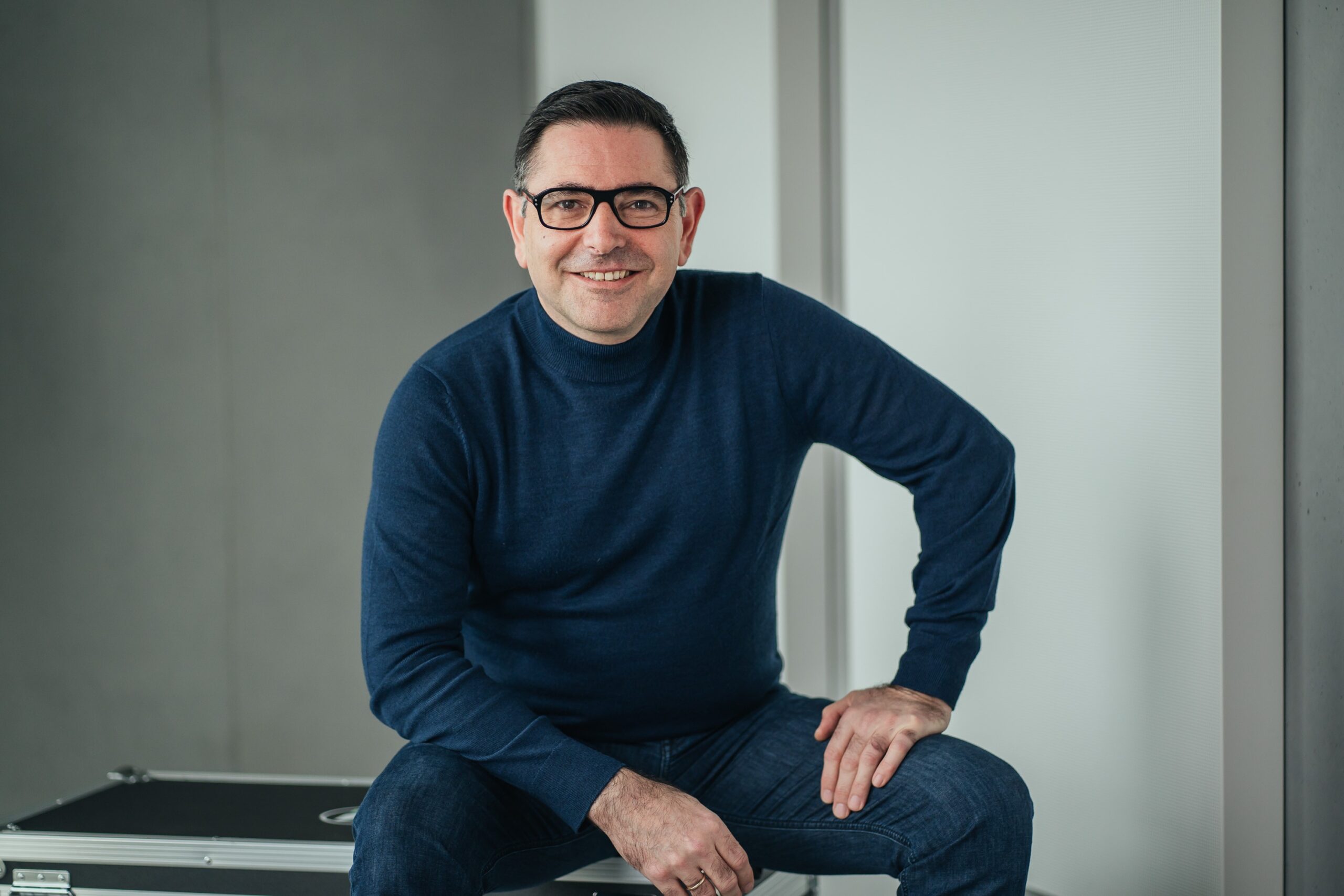Interview With Bahadir Basdere
"The year feels like it's in fast forward"
The Trench Group has been independent since April 2024. A lot has changed since the carve-out from Siemens Energy by new owner Triton. CEO Bahadir Basdere explains why independence is opening up completely new growth opportunities and how it is changing the corporate culture.
Trench has been independent for over a year now. What is your initial assessment? And how has the company changed in the year since the carve-out?
Dr. Bahadir Basdere: The year since the carve-out feels like it has flown by. It has been incredibly exciting, intense, and dynamic. Preparations began well before April 1, 2024. Sometime before that date, we decided with our owner that Trench would become independent.
Please tell us how you came to that decision.
Basdere: We were convinced that, as part of a large corporation like Siemens Energy, we would find it difficult to defend our strong market position and fully exploit our growth potential in a very dynamic and exciting market environment. We had been serving Siemens Energy’s competitors General Electric (GE) and Hitachi for a very long time, even under the Siemens Energy umbrella, but always with the handbrake on. We also decided to carve out the business because we saw that it was not possible to invest sufficiently in our growth under our former owner.
As the management team, you obviously didn’t like that…
Basdere: …of course not. Trench was already a leader in its markets at the time. And these markets were just exploding! To grow with the market, you need to invest in production capacity, innovation, and people. The logic is simple: if you don’t at least grow with the market in such a phase, you lose market share. And that can be the beginning of the end.
But if the market situation was so good at the time, why did Siemens Energy sell Trench in the first place?
Basdere: Our owner at the time made a strategic decision to focus on large-scale projects. Our business is primarily a direct product business. Project business is different in nature and is managed on a long-term basis. In addition, the organizational structure was changed in such a way that Trench no longer fit in. The group was also experiencing problems at the time. The figures weren’t right, and the wind power division was a major construction site. From that perspective, the sale of Trench was a good opportunity for Siemens Energy to simplify its system. And ultimately, Trench presented itself as the simplest and quickest option for a sale.
How did the workforce react when the sale became a topic of discussion? The umbrella of Siemens Energy certainly gave many people a feeling of security. How did you manage to convey the sale to employees as an opportunity rather than a threat?
Basdere: That’s a very important point. And you must differentiate a little here. Trench currently has around 2,600 employees, compared to just under 2,400 two years ago. Most of these people worked in the factories. And these units, these factories, have always been very independent, even when we were still part of Siemens Energy. All Trench units have a history that predates Siemens Energy, i.e., before 2004. And there was already a Trench culture back then.
Can you explain that? What is the Trench culture?
Basdere: There are several cultures at Trench. Our company has grown organically through acquisitions to become what it is today. We have a history that goes back 125 years – and it is the history of many individual personalities and companies. These include Haefely in Switzerland, Meirowsky in Cologne, Raupach in Bamberg, Scarpa & Magnano in Italy, and of course Tony Trench in Canada. All these individuals have made a significant contribution to the identity of today’s Trench company. For example, the measuring transformer was invented in Italy, the feed-through in Cologne, and Tony Trench, after whom the company is named, invented the coil in 1962. So, it is a diverse range of cultures that have grown together over more than 100 years.
The speed with
which we achieved
our autonomy is remarkable.

How far along are you in the process of becoming independent?
Basdere: We are now 100% independent, so there are no more dependencies on our former owner. We achieved this level of independence quickly after the carve-out. I would like to emphasize that this is not something that can be taken for granted. The speed with which we achieved our autonomy is remarkable. This is a great achievement by the entire team! And I am very grateful to be part of this team. Part of this process also involved quickly separating our trench sales organization from the global Siemens Energy organization and setting it up as an independent entity. We worked day and night to identify new agents and establish new sales channels. Everything is now in place. The team did a fantastic job here too. A well-established sales structure is important to us as it ensures that we can maintain our global presence.
Things were a little bumpy in the finance department at first, but then our CFO Brigitte Kurz came on board in June 2024. The necessary professional structures were put in place and we found the right colleagues to join us. Above all, however, we managed to secure refinancing after just ten months of independence. This means that we are now financially independent and, above all, well positioned for the future. This creates room for growth and new jobs, while also securing existing jobs.
So overall, we are on the right track. And don’t forget, we have also moved our business forward at the same time. We have grown. Compared to the 2023 fiscal year, we grew by almost 30% in revenue in the 2024 fiscal year. That is a lot. In terms of order intake, we have become a billion-dollar company.
That all sounds very encouraging. But the transformation into an independent company is a comprehensive process that also includes issues such as a common culture and a shared trench spirit. How far have you got with that?
Basdere: We are working hard on it. We need to focus intensively on welcoming and integrating our many new colleagues. At headquarters alone, two-thirds of our colleagues are new. That’s a big change, which I really enjoy because it brings a lot of new ideas. But on the other hand, these employees now must be integrated. Above all, they need to quickly establish links with their interfaces in the factories. It’s very important that we get integration right at this level. That’s a big challenge.

That also requires new processes…
Basdere: … absolutely. And that includes professionalizing our processes. We need to make our structures and workflows efficient. That’s a big task because Trench comes from a highly regulated corporation. However, all of this presents a great opportunity for us: if we reduce regulation and increase professionalism at the same time, we will quickly reach a very attractive level. We have everything we need to do this: a certain size, nine production sites and four representative offices worldwide, and an order volume of more than one billion euros.
Triton Partners, the owner of the Trench Group, is a private equity firm. Why is Triton a good partner for Trench?
Basdere: We share a common interest with our owner, namely, to improve the company and increase its value. To achieve this, a few tasks need to be completed: for example, increasing volume, boosting productivity – in other words, manufacturing products more efficiently – and, of course, growing. This has advantages for both the owner and the company.
Are there also advantages for the employees?
Basdere: Of course! For them above all! Because sustainable growth means long-term job security. We also create well-paid jobs. It’s a win-win situation. Another very positive change brought about by the private equity environment is the speed with which we can make decisions. And that’s for our own company. It’s very refreshing not to be subject to the constraints of a large corporation anymore.
Unlike in a large corporation?
Basdere: Constraints always exist in a large corporation. If there are problems in one area, they are often solved at the expense of a well-functioning area. That makes sense from the perspective of corporate management. However, the well-performing area often does not receive the resources it needs to invest in its own growth. At Trench, since the carve-out, we have been able to use all the money we earn for our growth. In concrete terms, this means that in this and the next fiscal years, we will invest twice as much money per year as we did under Siemens Energy.
You mentioned the speed of decision-making. Do you have an example?
Basdere: Our plant in Austria. We will double its volume. We are investing more than 40 million euros in the factory in Leonding near Linz. That would most likely not have been possible as part of Siemens Energy. We decided on this investment with Triton in a very short time. We also made the decision to build a new plant in the US within a few weeks – that would certainly have taken a year and a half in a large corporation.
So, speed is a big advantage…
Basdere: …absolutely! Speed is important because the world is changing at a rapid pace. In such an environment, it is a great advantage to have an owner who has a strong industrial focus and therefore knows when opportunities need to be seized. The members of our Advisory Committee understand our business and our markets very well: they have held senior positions at companies such as ABB and Siemens and are complemented by partners from our owner Triton. They also contribute in-depth knowledge of financial markets and investment issues. It is a real privilege to work with these people.
The goal of every private equity firm is to sell the shares in the companies it acquires in the medium term. In technical terms, this is called the exit process. This also opens up new opportunities for Trench. What do you think these are?
Basdere: The business model of private equity firms is to buy companies that are either performing poorly or are in an environment where they cannot fully develop. The latter applies to Trench. We are a diamond in our industry, but our true value could not be realized within the huge Siemens Energy company. We were in the wrong place. The opportunities and financial resources we gained through the carve-out have enabled us to grow in a short period of time and make this diamond sparkle. And in this process, it is of course intended that the Trench Group will be transferred to other hands as a stronger company. In financial market and investment language, this is called an “exit.” We cannot yet predict how this exit will play out. However, there are several possibilities, such as another private equity firm, a strategic investor, or another industrial company. We may also go public. Ultimately, though, it doesn’t matter who the next owner is. What matters is that we have strengthened our position and become a better, more successful company.
How far have you gotten with this?
Basdere: We’re on a really good path. We’re what’s called a platform investment. That means an investor like Triton buys an industrial diamond like Trench, works out a medium-term growth plan with management, and lets it unfold. That’s what’s happening with us right now. And it’ll stay that way for the next two years or so. The focus is on organic growth, i.e., expanding our market position and improving our productivity.
Are acquisitions also an option?
Basdere: Of course, we are looking at companies on the market that could be a good fit for us. But now, we have our hands full dealing with the current growth. Acquiring another company and integrating it into the group involves a lot of effort. That would probably be too much for us now.


